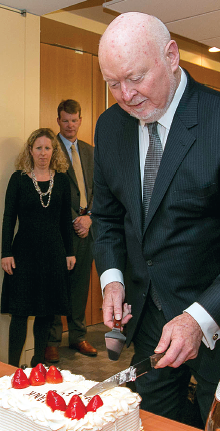On February 1, Paul Burke announced his intention to retire July 1 as executive director of the American Psychiatric Association Foundation, a post he has held for nine years.
“I have tried to tie the Foundation more closely to APA as we address mental health issues that are national in scope but local in application,” said Burke in an interview.
The Foundation oversees 13 public educational programs and partnerships, 30 awards, and nine fellowships that together have expanded public awareness of mental health issues, improved the mental health of diverse populations, and supported the psychiatric profession.
“We are grateful for Paul’s many years of outstanding service working to increase public awareness and improve mental health care,” said APA Foundation Board Chair Saul Levin, M.D., M.P.A., who is also APA’s CEO and medical director. “Paul leaves behind a legacy of brilliant work with the Foundation, which implemented some really tremendous programs during his tenure, such as Typical or Troubled? and the Partnership for Workplace Mental Health.”
Typical or Troubled? trains teachers, coaches, counselors, and other school personnel to understand signs and symptoms associated with mental illness in students and then refer them for help. The program existed before Burke was hired, but he created a strategic plan to expand it and make it more visible. By now, Typical or Troubled? has trained 70,000 school staff in 1,400 schools enrolling more than one million students.
“Through the Partnership for Workplace Mental Health, Paul was instrumental in helping corporations see the economic and moral need for good mental health coverage,” said Richard Harding, M.D., a clinical professor of neuropsychiatry at the University of South Carolina in Columbia and former Foundation and APA president. “More recently, he has worked with members of the Foundation board to make it a national priority to divert people with mental illness out of the criminal justice system and into treatment.”
To that end, the Foundation’s collaboration with the National Association of Counties, the Council of State Governments, and the U.S. Department of Justice’s Office of Justice Programs will culminate in the National Stepping Up Summit in Washington on April 17 and 18 to address the overrepresentation of persons with mental illness in the nation’s jails and prisons.
“We also have been a sponsor of ‘Healthy Minds,’ the public television series on mental health, and have been able to suggest topics and APA leaders as experts,” said Burke.
This past year, under Burke’s leadership, the Foundation became a founding member of the Campaign to Change Direction, a collective effort led by Give an Hour (GAH). GAH assists military service members returning from this century’s wars in Afghanistan and Iraq, a topic close to his heart as a veteran of an “all-expenses-paid walking tour of Southeast Asia” in 1970 and 1971.
“My experience as an Army officer taught me things that remain with me today: to accomplish the mission and to care for the welfare of your people, as well as the need to build teams and the ways to build them,” said Burke. He was twice awarded the bronze star for his service in Vietnam.
“Paul arrived at a critical point in the Foundation’s evolution,” recalled Altha Stewart, M.D., an assistant professor of psychiatry at the University of Tennessee Health Sciences Center in Memphis and another former Foundation president. “It was a small, little-known organization, but Paul has grown it significantly over the last decade, and people know about it now.”
Stewart also praised Burke’s expansion of the Foundation’s Awards for Advancing Minority Mental Health. The awards have supported programs and research to improve psychiatric care delivered to racial and ethnic minorities.
Yet another change was the Foundation’s shift in its relationship with the pharmaceutical industry, said Stewart.
“Paul built a stronger firewall so the Foundation could pursue its goals without interference that sometimes comes from that direction,” she said. “That he was able to negotiate these challenging barriers was a testimony to his temperament, leadership, and administrative skills. He leaves some big shoes to fill.”
Burke expressed hope that a successor can be chosen before APA’s 2016 Annual Meeting so that person can meet in Atlanta with all those involved in the Foundation.
Retirement will include more than sitting on a dock with a fishing pole. He expects to do some consulting, some volunteering with his church in Arlington, Va., and possibly return to part-time teaching at George Mason University, his alma mater.
In the meantime, he still has work to do at the Foundation.
“We are pleased that Paul will remain at the helm of the Foundation for the next several months to continue this important work and to ensure a smooth transition,” said Levin. ■
The American Psychiatric Association Foundation’s website can be accessed
here.

